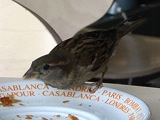Coraline Bichet PhD thesis
 Avian malaria evolutionary ecology: hosts immunity and evolution of virulence
Avian malaria evolutionary ecology: hosts immunity and evolution of virulence
Defended on the 18th December 2012
Funding: French research minister grant
Supervisor: Gabriele Sorci
Started in October 2009
Abstract
Host-parasite interactions are one of the main topics in evolutionary sciences. This complex coevolution depends on several trade-offs and can be influenced by environmental factors. Here, we propose to study host-parasite interactions with a multi-level approach, using experimental and natural population studies, focusing on avian malaria parasites. First, we studied the effect of host characteristics, and more precisely the immune system. The immune system confers benefits in terms of protection against the parasite, but can also generated immunopathological costs. Life history traits, like age or social status, appear to modify parasitemia but not prevalence. In a second part, we evaluated the effect of environmental factors on host-parasite interactions. We found that temperature and heavy metal contamination had an effect on population prevalence, but not on host parasitemia. We also showed the direct parasite influence on host population genetic structure, and more precisely on MHC genes.
Keywords
avian malaria, domestic canaries, house sparrow, major histocompatibility complex, immune system, life history traits, environment, mate choice.
- extrait:
- lien_externe:
- kc_data:
- a:8:{i:0;s:0:"";s:4:"mode";s:0:"";s:3:"css";s:0:"";s:9:"max_width";s:0:"";s:7:"classes";s:0:"";s:9:"thumbnail";s:0:"";s:9:"collapsed";s:0:"";s:9:"optimized";s:0:"";}
- kc_raw_content:
 Avian malaria evolutionary ecology: hosts immunity and evolution of virulence
Avian malaria evolutionary ecology: hosts immunity and evolution of virulenceDefended on the 18th December 2012
Funding: French research minister grant
Supervisor: Gabriele Sorci
Started in October 2009
Abstract
Host-parasite interactions are one of the main topics in evolutionary sciences. This complex coevolution depends on several trade-offs and can be influenced by environmental factors. Here, we propose to study host-parasite interactions with a multi-level approach, using experimental and natural population studies, focusing on avian malaria parasites. First, we studied the effect of host characteristics, and more precisely the immune system. The immune system confers benefits in terms of protection against the parasite, but can also generated immunopathological costs. Life history traits, like age or social status, appear to modify parasitemia but not prevalence. In a second part, we evaluated the effect of environmental factors on host-parasite interactions. We found that temperature and heavy metal contamination had an effect on population prevalence, but not on host parasitemia. We also showed the direct parasite influence on host population genetic structure, and more precisely on MHC genes.
Keywords
avian malaria, domestic canaries, house sparrow, major histocompatibility complex, immune system, life history traits, environment, mate choice.
